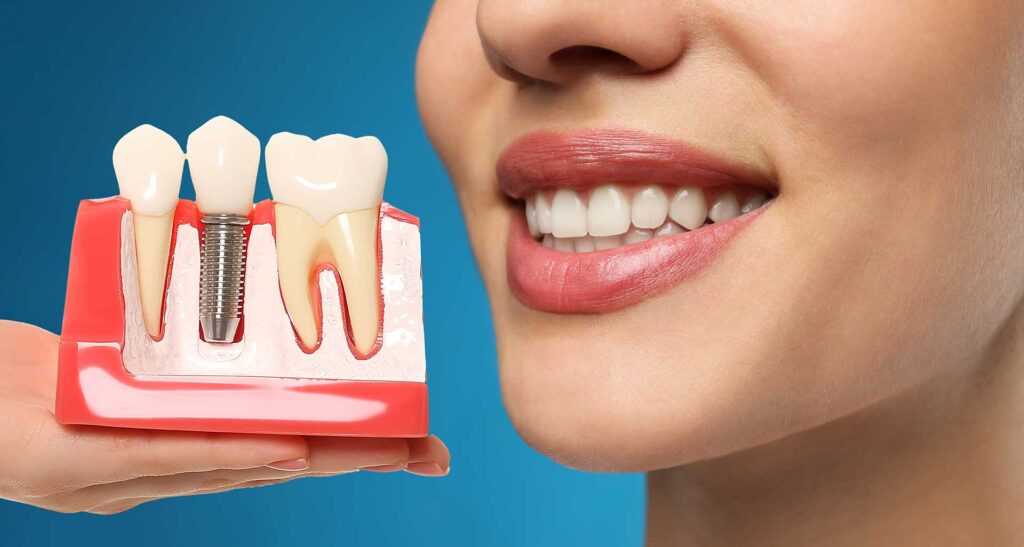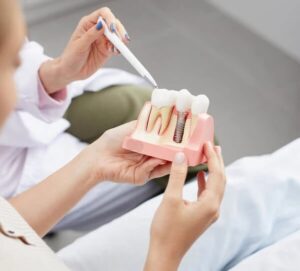
August 13, 2025
Dental implants have become one of the most popular and reliable ways to replace missing teeth. With their natural look, long-term durability, and ability to preserve jawbone health, they’ve quickly become a top choice among both dentists and patients. But as effective as they are, not everyone is an immediate fit for this solution.
Becoming a dental implant candidate involves more than just having a missing tooth – it requires a full assessment of your oral and overall health. Factors like bone density, gum condition, and lifestyle habits can all affect your dental implant eligibility. Understanding these factors early can save time and help you make the best choice for your smile.
If you’ve been exploring missing teeth solutions and are wondering where implants might fit in, this guide will walk you through the signs, qualifications, and even some of the reasons you might not qualify – plus what you can do about it. Let’s help you find out if dental implants are right for you.
Understanding Dental Implants: Procedure & Purpose
Dental implants are a permanent and highly effective way to replace missing teeth. Unlike dentures or bridges, implants are surgically placed into the jawbone to mimic the structure of a natural tooth root. This makes them one of the most stable and long-lasting missing teeth solutions available today.
A typical implant consists of three parts: the implant post, which is placed into the bone; the abutment, which connects the post to the visible portion; and the crown, which is custom-made to match your natural teeth. Together, these components create a strong, functional replacement that feels and looks like the real thing. If you’re wondering whether implants are right for you, learning about the signs you may need dental implants can help you take the next step with confidence.
Dental implant procedures are typically performed in stages, beginning with a consultation and imaging, followed by surgery, healing, and crown placement. Because the process depends heavily on how well your body can support the implant, your overall health, bone structure, and oral hygiene habits all play a role in success.
This is why proper evaluation is so important. Not everyone will be immediately ready for implants – but many can become eligible with the right preparation. In the next section, we’ll look at the signs that might indicate you’re a good candidate.
To learn more about why implants are the most complete replacement option, read our blog on why dental implants are the best option.
Signs You May Need Dental Implants
If you’re dealing with ongoing dental issues or tooth loss, it may be time to consider implants as a long-term solution. Here are some of the most common signs you need dental implants, and why acting early can make a difference.
One of the clearest indicators is one or more missing teeth. Gaps in your smile don’t just affect appearance—they can also lead to shifting teeth, bite problems, and bone deterioration over time. Even a single missing tooth can put added stress on surrounding teeth and your jaw.
Bone loss in the jaw is another important sign. When a tooth is lost and not replaced, the bone that once supported it begins to shrink. Dental implants help stimulate and preserve bone, making them one of the few restorative options that protect long-term oral health.
You might also be a dental implant candidate if you’re frustrated with loose or ill-fitting dentures. Implants can anchor prosthetics more securely, eliminating the need for adhesives or worrying about slippage while eating or speaking.
If loose dentures are affecting your daily comfort or confidence, implant-supported dentures can offer a secure, stable alternative. Not sure whether implants or dentures are right for you? Explore our full comparison here: Dentures vs Implants: Which One Is Right for You?
Lastly, if you have damaged or decayed teeth that can’t be restored with fillings or crowns, replacing them with implants may offer a more reliable and lasting solution.
Recognizing these signs early and consulting with a dental professional can help you plan your next step toward a healthier, more stable smile.
Who Qualifies for Dental Implants?
So, who qualifies for dental implants? While many people assume that missing a tooth automatically makes them eligible, there are a few important health markers your dentist will consider first. These factors help determine if you’re a good candidate for dental implants or if preparatory care is needed beforehand.
First, your overall health matters. Chronic conditions like uncontrolled diabetes or autoimmune disorders can affect healing after surgery. That’s why dentists look for patients in generally good health and without conditions that may complicate recovery.
Next is dental health for implants. Your gums must be free of infection, and there should be no active periodontal disease. Gum health is critical not just for placing the implant but for keeping it secure in the long run.
Bone density is another major consideration. A healthy jawbone provides the support needed for the implant post to fuse properly with the bone. If you’ve experienced bone loss, options like bone grafting can often rebuild the area and make implants possible.
Smoking is also a risk factor. It interferes with healing and increases the chances of implant failure. However, if you’re a dental implant candidate who currently smokes and are willing to quit during the treatment period, many providers will still consider you eligible.
In some cases, pre-treatments like tooth extractions, sinus lifts, or grafting procedures can greatly improve your candidacy. The bottom line? Even if you’re not immediately ready for implants, you might still qualify with a few extra steps.
Who Would Not Be a Good Candidate for Dental Implants?
While many patients are eligible for dental implants, certain conditions or lifestyle factors can lower the chances of long-term success. Understanding who would not be a good candidate for dental implants can help set realistic expectations and guide the next steps in treatment planning.
Patients with uncontrolled diabetes are often at higher risk for slow healing and infection, which can interfere with the integration of the implant. The same goes for individuals with immunocompromised conditions, where the body’s ability to recover from surgery is significantly reduced.
Smoking is another major concern. Tobacco use limits blood flow to the gums and bones, both of which are essential for proper healing and implant stability. While quitting during the implant process may improve your chances, active smokers may not meet the standard for dental implant eligibility.
Additionally, severe bone loss in the jaw can disqualify a patient—especially when grafting or regeneration procedures aren’t viable options due to health issues or lack of support structure.
If you fall into one of these categories, it doesn’t always mean implants are entirely off the table. It simply means you may need alternative treatment or preparatory procedures. A full evaluation is the only way to know for sure if you’re a dental implant candidate and whether steps can be taken to improve your eligibility.
What Else Affects Your Dental Implant Timeline and Procedure?
Even if you’re a qualified dental implant candidate, the treatment process isn’t always immediate. Several planning factors and clinical guidelines help ensure long-term success—and understanding them early can help you know what to expect.
One concept often discussed during treatment planning is the 3/2 rule for dental implants. For a deeper dive into how implant dentistry has advanced, check out our article on the evolution and advancements in dental implants. This guideline helps determine proper spacing between implants and between implants and natural teeth. The 3mm/2mm rule helps prevent issues and ensures proper function and appearance of the final crown.
Another important aspect is the healing period. You might be wondering: why do you have to wait 3 months for dental implants? After placement, the bone needs time to fuse with the implant—a process called osseointegration that usually takes about three months.
Modern dental implant procedures are highly predictable, but timing and proper planning are key. If your dentist suggests a wait, graft, or temporary tooth, it’s to ensure a stable, lasting result.
Being informed about each phase of the process helps you prepare mentally and physically—and confirms your role as a committed dental implant candidate.
What to Do If You Think You’re a Candidate
If you’re starting to believe you might be a dental implant candidate, the next step is a professional consultation. During this visit, your dentist or oral surgeon will assess your mouth using tools like 3D imaging and CT scans. These tools assess bone, gums, and nearby structures—key factors for successful implant placement.
If you’re currently searching for the right provider, don’t miss our guide on How to Find a Dental Implants Specialist in Renton WA. It covers what to look for and how to make the best choice for your needs.
Your provider will also review your medical history and oral hygiene habits to ensure you meet the necessary standards for dental health for implants. If any issues are identified—such as gum disease or bone loss—they’ll discuss options to address them before proceeding.
From there, a custom treatment plan will be created based on your needs, goals, and overall health. This may involve timing plans, bone grafting, and a clear overview of each step.
Getting started is often the hardest part, but a consultation will give you the clarity and direction you need. And even if you’re not fully eligible right now, the right provider can help you move toward becoming one.
Conclusion: Take the First Step Toward a Complete Smile
Dental implants remain one of the most reliable missing teeth solutions, offering long-term function and a natural look. But not everyone qualifies right away. Factors like bone density, gum health, and lifestyle habits all play a role in your dental implant eligibility.
If you’ve noticed any signs you may need dental implants—like missing teeth, shifting bite, or difficulty chewing—now is the time to take action. The first step is a professional evaluation to determine if you’re a candidate and what steps, if any, are needed to prepare.
With the right guidance and treatment plan, you could be on your way to a stronger, healthier smile that lasts for years to come.
Ready to Find Out If Dental Implants Are Right for You?
If you’ve been dealing with missing teeth, loose dentures, or long-term dental issues, now is the time to explore lasting solutions. At Dentistry at Renton, we offer comprehensive evaluations with a dentist in Renton to determine if you’re a good dental implant candidate. Using advanced technology like 3D imaging and CT scans, we assess your bone health, gum condition, and overall oral health to create a treatment plan that fits your needs.
Even if you’re not immediately eligible, there may be steps we can take—such as bone grafting or periodontal care—to help you become a candidate. Our team is here to guide you every step of the way with honest answers and expert care.
Don’t wait to restore your confidence and comfort.
Contact Dentistry at Renton today to schedule your consultation and take the first step toward a healthier, more complete smile.
New Patient Specials
New patients are invited to take advantage of one of our first-time visitor specials!
To claim the offer, screenshot or print the coupon and show it at your initial appointment.
$149 New Patient Special Plus $100 Off Your Second Visit*
**New patients only. A $369 value. Cannot be combined with other offers or insurance.
10% Off Same Day Dental Services*
**New patients only. Cannot be combined with other offers or insurance.
$100 Off When We Treat Two Family Members on the Same Day
**Cannot be combined with other offers or insurance.
New Patient Online Offer
Receive $100 off Future Dental Treatment
with a New Patient Exam
Call (253) 852-4746 today to schedule.
Ready to Book Now? Use our Online Scheduler
BOOK AN APPOINTMENT
Patients choose Dentistry @ Renton for our convenient scheduling, affordable pricing, outstanding service, and incredible results. Experience the difference today!



